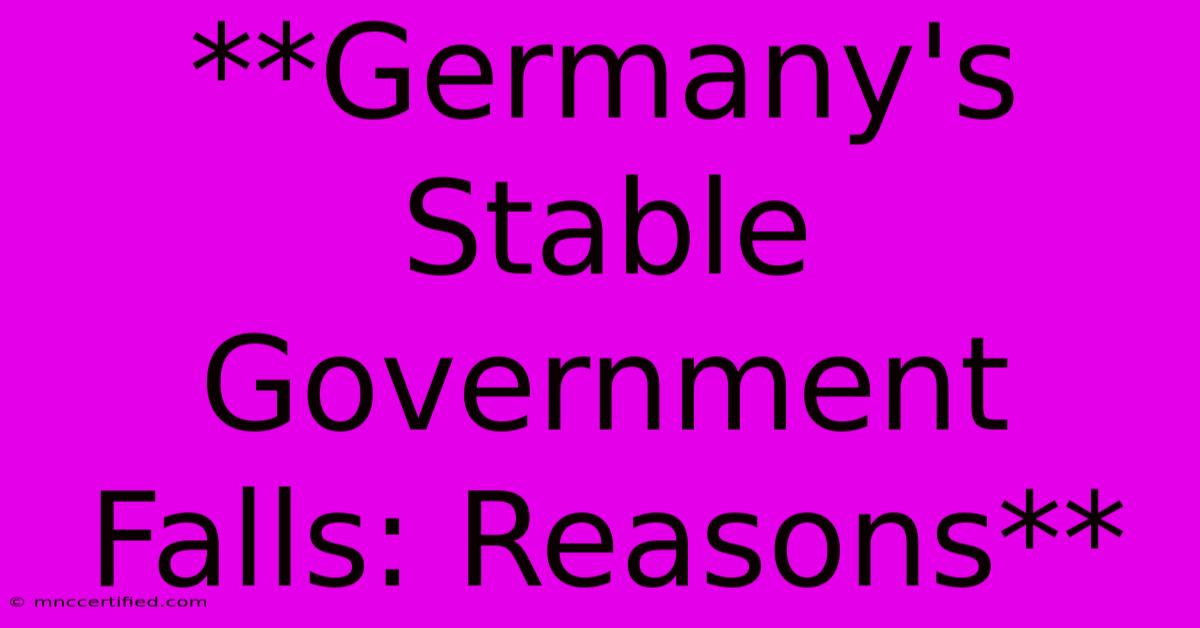**Germany's Stable Government Falls: Reasons**

Table of Contents
Germany's Stable Government Falls: Reasons Behind the Political Earthquake
On [Date of event], Germany's political landscape shifted dramatically as the long-standing coalition government collapsed. This unexpected development sent shockwaves through the nation and beyond, raising questions about the future of Germany's political stability and its role in European affairs. While the immediate cause was [Briefly mention the trigger event], deeper underlying factors contributed to the government's downfall.
Key Contributing Factors to the Government's Collapse
1. Erosion of Public Trust: In recent years, the governing coalition faced growing public dissatisfaction. [Mention specific issues like economic inequality, social welfare concerns, or environmental policies]. This eroded trust in the government's ability to address key issues, leading to a decline in support for the ruling parties.
2. Internal Disputes and Power Struggles: [Explain any conflicts or disagreements within the coalition government]. These internal divisions, often fueled by differing ideologies and competing priorities, weakened the coalition's unity and made it more susceptible to collapse.
3. Rise of Populist and Nationalist Sentiment: The rise of populist and nationalist parties, [mention specific parties or movements], tapped into public anxieties and frustrations with the establishment. Their growing popularity challenged the traditional political order and undermined the government's authority.
4. Failure to Address Key Challenges: The government struggled to effectively respond to various challenges, including [mention specific challenges like immigration, climate change, or economic stagnation]. This failure to deliver on key promises further alienated voters and fueled discontent.
The Impact of the Government's Collapse
The collapse of the government has significant implications for Germany and Europe.
- Political Instability: The uncertainty surrounding the formation of a new government could lead to a period of political instability. This could create difficulties in implementing key policies and responding to external challenges.
- Economic Uncertainty: The political turmoil could disrupt economic decision-making and create uncertainty for investors, potentially hindering economic growth.
- European Leadership: Germany's role as a leading force in European affairs may be weakened by the government's collapse. This could create challenges in navigating European issues and coordinating policies across the continent.
Looking Forward: The Road Ahead
The collapse of the government presents a significant challenge for Germany. The political landscape is likely to remain volatile as the country navigates the formation of a new coalition. [Mention potential scenarios or outcomes, like new elections, a different coalition, or a minority government].
This event serves as a reminder that even stable democracies face challenges and require ongoing adaptation to address changing societal needs and political dynamics.
Keywords: German government, political instability, coalition collapse, public trust, populist parties, European leadership, economic uncertainty, political landscape, future of Germany.

Thank you for visiting our website wich cover about **Germany's Stable Government Falls: Reasons**. We hope the information provided has been useful to you. Feel free to contact us if you have any questions or need further assistance. See you next time and dont miss to bookmark.
Featured Posts
-
Israeli Fans Attacked In Amsterdam Police Say
Nov 08, 2024
-
Hamas Backed By Uk Neurologist Report
Nov 08, 2024
-
Bengals Legend Cautions Against Overconfidence
Nov 08, 2024
-
Ravens Vs Bengals Thursday Night Score
Nov 08, 2024
-
Why John Bishop Turned To Comedy
Nov 08, 2024